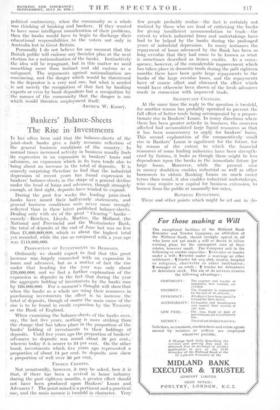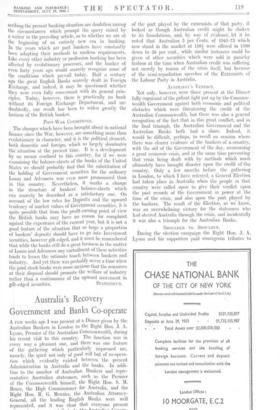Bankers' Balance-Sheets The Rise in Investments
Iv has' often been said that the balance-sheets of the joint-stock banks give a fairly accurate reflection of the general business conditions of the country:: In normal times increased activity in business usually .finds its expression in an expansion in bankers' loans 'and advances, an expansion which in its turn tends also to bring about an increase in the total of deposits. 'It is scarcely surprising therefore to find that the industrial depression of recent years has found expression in bankers' balance-sheets in the shape of a general decline under the head of loans 'and' advances, though strangely enough, at' first sight, deposits have tended to expand.
During the past few weeks the leading joint-Stock banks, have issued their. half.yearly statements,' and general business conditions were never more strongly reflected than in these latest published balance-sheets. Dealing only with six' of the great " Clearing ". bank- namely—Barclays, Lloyds, Martins, the Midland, :the National and Provincial and the Westminster Bank, the total of deposits at the end of June last was nd less than £1,880,000,000, which is about the highest total yet, recorded, ,while the rise 'as compared with a year ,ago was £118,000,000..
PROPO 14 TI 0 N' OF INVESTMEriTS TO DEPOSITS.
Ordinarily wc should expect to find that this great increase was .largely connected with an expansion'. in loans and advances, but as a matter of fact the rise under that heading for the year was only about £20,000,000, and we find a further explanation of- the : expansion in d'epositS in the fact' that during the year the aggregate holding 'of: 4-Wet:talents by the banks rose , by 166,000,000.• For a 'moments thought will show that when the banks as a'. whole are using their resource's in purchasing inVestnients the 'effect is to increase 'the total of deposits, though'of course the main cause of the rise is to be found in credit exPantion by the Treasury or the Bank of England. "
When examining the balance-sheets of the banks over, say, the last five years, nothing is more striking .than the change that• has taken place in the proportion of the banks' holding of investments to their holdingS. of deposits. Until five years ago the proportion of bankers' advanceq to deposits was round about 50 per cent., whereas today it is nearer to 34, per cent. On the other hand, investments _which:, five years ago represented a proportion 'of about' 14 per cent. to deposits now show a proportion of well over 30 per cent.
FROZEN CREDITS.
Not unnaturally, however, it may be asked, how. it is that, if there has been a revival in home industry during the past eighteen months, a greater effect should: not have been produced upon Bankers' Loans land; Advances ? The point raised is a pertinent and a 'practical one, and the main answer is twol'old i ifLii VCry • few people probably realize—the fact is certainly not realized by those who are fond of criticizing the banks for giving insufficient accommodation to trade—the extent to which industrial firms and undertakings have *had to be helped by the banks during the prolonged years of industrial depression. In many instances the repayment of loans advanced by the Bank has been so long overdie that they had come to be known as what is sometimes described as frozen credits. As a conse- quence, however, of the considerable improvement which has taken place in domestic trade during the pat eighteen months there have been quite large repayments to the banks of the large overdue loans, and the repayments have of course offset and obscured the effect which would have otherwise been shown of the fresh advances made in connexion with improved trade.
SIGNIFICANT CHANGES.
At the same time the reply to the question is twofold, for another reason has probably operated to prevent the full effect of better trade being accompanied by a propor- tionate rise in Banker? Loans. In many directions where there has been greater activity in business, the ,conceins affected had accumulated large liquid resources so that it has been unnecessary to apply for bankers' loins. This second explanation of the comparatively sinall rise in Bankers' Loans is significant for the future, for by reason of the extent to which the financial resources of some leading industries have been strength- ened by fusions, it looks as though there might be less dependence upon the banks in the immediate future or large loans. Moreover, while the present ease in money doubtless enables industrial as well as other borrowers to obtain -Banking Loans on much easier terms than usual, it also enables industrial undertakings, who may require 'new capital for business extension, to borrow from the public at unusually low rates.
BANKING EVOLUTION.
These and other points which might be set out in de- scribing the present banking situation are doubtless among the circumstances which prompt the query raised by a writer in the preceding article, as to whether we are at the beginning of an entirely new era in banking. In the years which are past bankers have constantly been adapting their methods to modern requirements. Like every other industry or profession banking has been affected by evolutionary processes, and the banker of even forty years ago would scarcely recognize some of the conditions which prevail today. Half a century ago the great English Banks scarcely dealt in Foreign Exchange, and indeed, it may be questioned whether they were even fully conversant with its general prin- ciples. Today, however, there is practically no bank Without its Foreign Exchange D,epartment, and • nil= doubtedly, one result has been to widen greatly the horizon of the British banker.
POST-WAR CONDITIONS.
The changes which have been brought about in national finance since the War, however, arc something more than eyelutionary in character, and it is,,,the political element, beth. domestic and foreign, Which so largely dominates the situation at the present time. It is, a„ development by no means confined to this country, for if we were examining the balance-sheets of the banks of the United States we should probably find that the substitution' of the holding of Government securities for the ordinary Loans and Advances was even more pronounced than in this country: Nevertheless, it marks a change in the structure of bankers' balance-sheets which can scarcely be described as a satisfactory one. On account of the, low rates for Deposits and the :upward tendency of Market values of Government securities, it is quite possible ,that from the profit-earning point of view the British banks may have no reason for complaint against, the experience of the current year, but it is not a good: feature of the „situation that so large a proportion of bankers' deposits should have to go into Investment securities, however gilt-edged, and it must be remembered that while the banks still do a great business in the matter of Loans and Advances any curtailment of these activities tends to lessen the intimate touch between bankers and industry. And yet there Was probably never a time when the joint stock banks were more anxious that the resources at their disposal should promote the welfare of industry rather than a "continuance of the upward movement in



























































 Previous page
Previous page